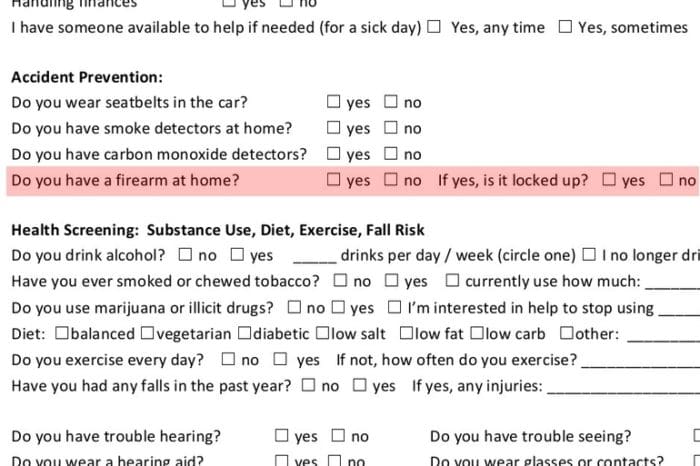Northwell Health, New York State’s largest healthcare provider, is beginning a pilot program ostensibly intended to determine their patients’ “risk for firearm injury.”
Starting later this month, Northwell staff at two Long Island hospitals and a third on Staten Island will add a question to their routine screening of emergency room patients: Do you have a gun in your house? …
As part of the Northwell study, clinicians in the three hospitals’ emergency departments will ask patients specific questions about having firearms in their homes and determine their risk of injury. Each response is scored and embedded into the patient’s electronic health record, which will help guide discussions and establish next steps for care. Motivational interviews, education and other resources will also be available.
This isn’tn particularly new. Care providers have been using Medicare/Medicaid CMS-approved patient intake forms with firearms questions for years. Complain to CMS about the boundary violation and they’ll deny responsibility, explaining that a private company created the forms and added the questions on their own. But if you lie about your guns, CMS won’t pay your claim.
The Northwell program, though, takes this to a new level by hitting everyone who goes to the ER, whether they’re covered by Medicare or privately insured. And it targets those who may not be thinking clearly or rationally at the time. There’s generally a good reason they’re in the ER.
You may think that using electronic medical records as a gun owner database is safe enough, because the Health Insurance Portability and Accountability Act of 1996 keeps your records from prying non-medical eyes. You’d be wrong.
Covered entities may disclose protected health information to law enforcement officials for law enforcement purposes as required by law (including court orders, court-ordered warrants, subpoenas) and administrative requests; or to identify or locate a suspect, a fugitive, a material witness, or a missing person.
Yes, the police — or the ATF — can ask to review medical records, including answers to those pesky gun questions.
What will the questions be? Northwell is vague about that and did not respond to my inquiry.
Suppose a questioner asks where the gun you own is stored, and a person who is disoriented with a high fever — or was given pain medication in the ambulance on the way to the ER — tells them they keep it in their night stand in case of burglars. That wouldn’t be in compliance with New York state’s safe storage law. Is the bedside pistol licensed and registered?
Perhaps that disoriented person needs to be red flagged just to be sure. Wouldn’t having that record be convenient for the police? The answers given in the ER to the gun questions might be the basis for getting the red flag order against him.
Collecting data from disoriented ER patients seems a bad practice. Suppose our hypothetical feverish patient babbles out a description of his imaginary gun room. I do believe Northwell is going to have some data quality control issues, even aside from gangbangers in for gunshot wounds simply lying to them. Or sensible people correctly thinking it’s none of their damned business.
